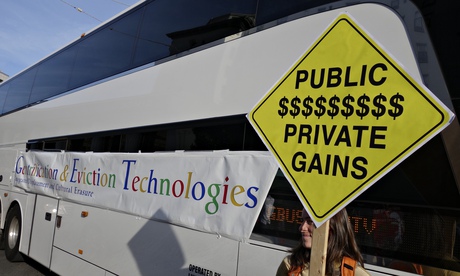Google's corporate mantra may be to do no evil, but to a determined band of activists in San Francisco the company could just be the devil incarnate.
Corporate buses that Google and other tech companies lay on to ferry their workers from the city to Silicon Valley, 30 or 40 miles to the south, are being targeted by an increasingly assertive guerrilla campaign of disruption. Over the last two months, a groundswell of discontent over the privatisation of the Bay Area's transport system has erupted into open revolt.
Well organised protesters have blocked buses, unfurled banners and distributed flyers to tech commuters who have seemed either nonplussed, embarrassed or downright terrified. And this could be just the beginning.
"We're in the planning process for the next protest," one of the organisers, Erin McElroy, told the Observer. "We're trying to stay creative with each one, not just repeat over and over."
Just before Christmas, a window was smashed on a Google bus in Oakland, across the San Francisco Bay. Last week, protesters doorstepped a Google engineer who they claimed was involved in working with the government to develop eavesdropping techniques and "war robots" for the military. "Anthony Levandowski is building an unconscionable world of surveillance, control and automation," they wrote on flyers left near his house. "He is also your neighbour."
Corporate security guards have started to make a discreet appearance as the protests escalate. The core grievance is one keenly felt by almost everyone in San Francisco: the way the tech sector has pushed up housing prices in the city and made it all but unaffordable for anyone without a six-figure salary. Almost no San Francisco police officers live in the city any more, and neither do most restaurant workers or healthcare workers. The funky, family-owned shops that once defined the city are closing because owners cannot afford the business rent, never mind the rent on their housing.
The activists claim that the so-called "Google buses" are exacerbating the problem, because they are making it easier for tech workers who might otherwise live closer to their offices to live in San Francisco instead.
In a metropolitan area known for its flamboyant political theatre, its anarchist streak and a tendency for liberals to turn on each other as much as their political enemies, the point has not always been made with the greatest subtlety.
"You are not innocent victims," one flyer directed at tech workers said. "You live your comfortable lives surrounded by poverty, homelessness and death, seemingly oblivious to everything around you, lost in the big bucks and success."
Already, splits are appearing in the protest movement. McElroy is part of a campaign championing affordable housing and fighting against a sharp rise in evictions. She does not condone the window-breaking, the attack on Levandowski, or the aggressive flyers. She also said she wanted the tech workers themselves to join the protests. That was in contrast to an anarchist commentator, The Counterforce, who wrote: "All of Google's employees should be prevented from getting to work."
Still, the protests have the attention of the city authorities. The public transport agency, which had previously allowed the Silicon Valley firms to operate their buses free of charge, agreed last week to introduce a tariff for use of city streets and city bus stops. It was, however, a notably modest tariff: just $1 per bus per bus stop. City officials said their hands were tied by rules preventing them from levying a more significant fee without a public vote endorsing a move. But that did not begin to satisfy the protesters, who heckled as two tech workers addressed a heavily attended public meeting and said they were looking for a much more comprehensive response.
"One dollar per bus stop is not in any way a remedy and does not mitigate the damage," McElroy said.
Google argues that the protesters are gunning for the wrong target, because the buses alleviated traffic and pollution and because most of the employees who take the bus would live in San Francisco anyway.
Those claims were challenged by a study published last week by researchers at Berkeley, across the Bay from San Francisco. They found that rents around the stops used by the Google buses were up to 20% higher than in otherwise comparable areas. They also found that 30-40% of tech workers would in fact move closer to their jobs if the bus service did not exist.



